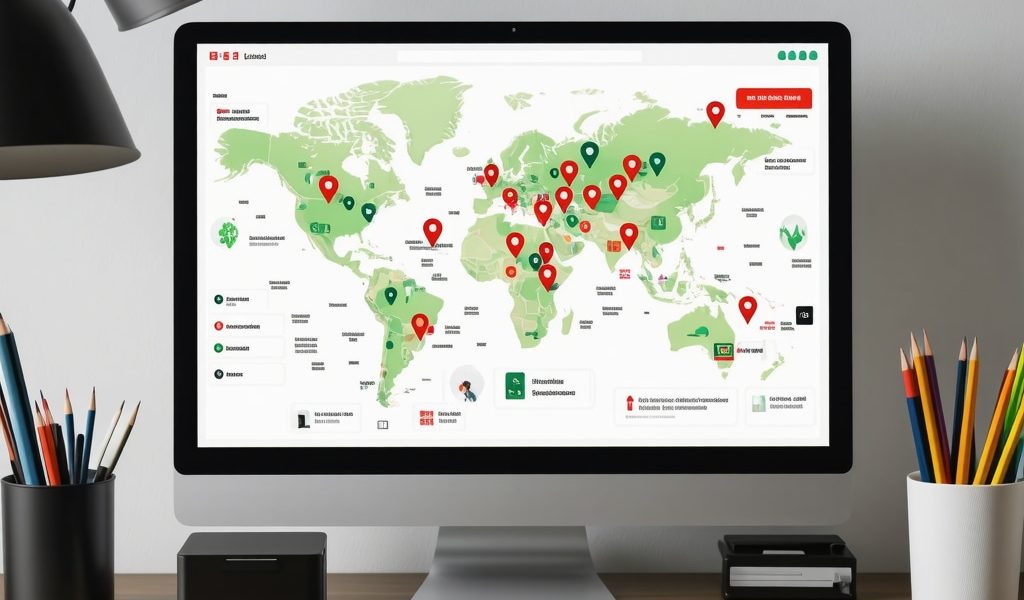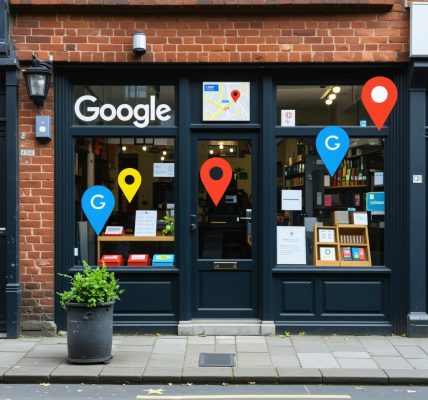How I Learned the Power of GMB Citation Management
When I first started managing local SEO for my small business, I underestimated the impact of citation management on Google My Business (GMB) ranking. Like many, I thought just having a GMB listing was enough to show up in local searches. But after months of stagnant local visibility, I dove deep into citation management — and the results were eye-opening.
Why Consistency and Accuracy Matter More Than You Think
One of the most important lessons I learned was about NAP consistency — that’s Name, Address, and Phone number. Ensuring these details are exactly the same across all citations, directories, and business listings feels tedious but is absolutely crucial. I experienced firsthand how even small inconsistencies hurt my local authority and ranking.
For example, I once had my business listed as “Joe’s Coffee Shop” on one platform and “Joe Coffee Shop” on another. This discrepancy confused Google’s algorithm and diluted my citation strength. After correcting these variations, I noticed a gradual but steady improvement in local search rankings.
How Do I Keep Track of All My GMB Citations Efficiently?
Managing multiple citations can feel overwhelming, especially when you’re juggling other aspects of your business. What helped me was using a centralized spreadsheet to track every citation source, login credentials, and update dates. Additionally, leveraging tools recommended by experts, such as BrightLocal or Moz Local, streamlined the process and ensured my citations stayed accurate and up-to-date.
By adopting a regular audit schedule, I could spot outdated or duplicate citations quickly and fix them before they impacted my SEO negatively. This proactive approach made a huge difference in maintaining a strong local presence.
The Role of Quality over Quantity in Citation Building
Early on, I thought that more citations meant better rankings. But through experience and consulting resources like Moz’s SEO guides, I realized that citation quality and relevance matter more than sheer volume. Citations from reputable, industry-relevant directories influence Google’s trust in your business far better than random or low-quality listings.
This insight led me to focus on authoritative local directories and niche-specific platforms. It not only strengthened my GMB profile but also attracted more targeted traffic, boosting my local authority organically.
Incorporating Expert Help and Continuous Learning
Sometimes, I found managing citations in-house too time-consuming. That’s when I explored professional GMB citation management services. Partnering with experts allowed me to focus on other critical business areas while ensuring my citations stayed optimized.
Also, staying updated with evolving best practices is vital. Google’s local SEO algorithms change, and citation strategies must adapt accordingly. I regularly follow authoritative sources and have benefited from guides like the one from Moz’s Local SEO Beginner’s Guide, which offers trusted insights to refine my citation management tactics.
Why Should You Care About Managing Your GMB Citations?
Proper citation management directly impacts your local search rankings and your business’s credibility in your community. I encourage you to audit your citations regularly, maintain consistency, and prioritize quality listings. Have you tried any citation management strategies that worked well or failed spectacularly? I’d love to hear your experiences and tips in the comments below. Your insights can help others navigate this complex but rewarding aspect of local SEO.
For those looking to dive deeper into effective GMB citation management techniques, check out this detailed guide that helped me improve my local rankings significantly.
Leveraging Structured Data to Enhance Citation Impact
Beyond maintaining consistent NAP information, integrating structured data markup on your website can amplify the authority of your citations. Schema.org markup helps search engines understand your business details precisely, which complements your GMB citations by reinforcing your local relevance. For instance, using LocalBusiness schema on your website ensures that Google can cross-reference your citations with your site information, improving trust signals significantly.
Implementing structured data requires technical know-how, but the payoff in local SEO performance is substantial. Tools like Google’s Structured Data Testing Tool enable you to validate your markup and ensure it’s error-free, a crucial step for maximizing citation effectiveness.
How Does Citation Velocity Influence Your Local Search Ranking?
Citation velocity refers to the rate at which new citations appear for your business over time. A sudden surge in citations can signal to Google that your business is gaining traction locally, which often results in a positive ranking boost. However, citation velocity must be natural and consistent — aggressive, unnatural spikes may trigger spam filters and harm your SEO.
Therefore, a strategic citation building plan involves gradually acquiring new, high-quality citations while maintaining existing listings. Frequent audits, like those discussed earlier, ensure that your citation profile remains robust and credible without appearing manipulative.
Incorporating Reviews and User Engagement with Citation Management
While citations are critical, combining them with active review management can elevate your local SEO strategy dramatically. Encouraging genuine customer reviews on platforms where you have citations not only strengthens your online reputation but also improves your GMB ranking factors.
Responding promptly and professionally to reviews adds an engagement layer that signals to Google your business’s authenticity and customer focus. This interaction, together with accurate citations, creates a comprehensive local SEO ecosystem that outperforms competitors relying on citations alone.
What Are the Emerging Tools and Trends for Citation Management Experts?
With evolving local SEO landscapes, several tools have emerged to assist citation management specialists in optimizing GMB rankings more efficiently. Platforms like BrightLocal and Moz Local continue to innovate with features such as automated citation scanning, duplicate detection, and competitive benchmarking.
Additionally, AI-powered tools are beginning to analyze citation quality by assessing domain authority and citation relevance, allowing experts to prioritize efforts on high-impact listings. Staying updated on these technologies and integrating them into your workflow is essential for maintaining a competitive edge.
How Can Businesses Maintain Citation Quality Amid Rapid Local SEO Changes?
Given the dynamic nature of Google’s local search algorithms, businesses face the challenge of keeping their citation strategy flexible yet effective. The key lies in establishing a routine citation audit and update schedule coupled with continuous education on emerging SEO best practices.
For example, subscribing to authoritative resources such as Moz’s Local SEO Blog or Ranking SEO GMB’s expert guides helps businesses stay informed about algorithm updates and new citation opportunities. Combining this knowledge with practical citation management tools results in sustained local search success.
For more insights on refining your GMB citation management and boosting your local rankings, explore our detailed guide on proven citation strategies.
If this deep dive into advanced citation management strategies resonates with your business goals, please share this post with fellow local SEO enthusiasts or leave your thoughts and experiences in the comments below. Your engagement helps build a knowledgeable community dedicated to mastering local search optimization.
When Small Details Make a Big Difference in Citation Management
One subtlety I’ve come to appreciate over time is how even minor formatting choices in your citations can ripple through your entire local SEO ecosystem. For instance, the way you abbreviate street suffixes (like “St.” versus “Street”) or include suite numbers can affect Google’s interpretation of your business location. Early on, I overlooked these nuances, assuming that as long as the core NAP was consistent, the rest didn’t matter. However, I learned that standardizing these details across all citations enhances Google’s confidence in your data, which can translate into better local rankings.
This level of precision requires patience and a keen eye, but it’s rewarding. It’s like tuning a musical instrument; the closer you get to perfect, the more harmonious your local SEO results become.
Integrating Citation Management Into a Holistic Local SEO Strategy
For me, citation management never exists in isolation. It’s deeply intertwined with other local SEO factors like website optimization, content marketing, and review generation. When I started linking my citation efforts with regular Google My Business posts and actively managing reviews, the compound effect was noticeable.
For example, I combined insights from effective GMB ranking strategies with citation audits to create a more robust local presence. This multi-pronged approach not only improved rankings but also enhanced customer engagement and trust.
How Do I Balance Citation Quantity with Quality Without Losing Momentum?
This question has often come up in conversations with fellow local SEO managers. From my experience, the key is to adopt a phased citation building approach. Start by securing your business on the most authoritative and relevant directories—quality over quantity here is critical. Then, gradually expand to niche or regional listings that align with your target audience.
Patience is essential because rushing to accumulate citations can trigger Google’s spam filters or dilute your local authority. Tools like BrightLocal and Moz Local, which I mentioned earlier, provide ongoing monitoring to ensure your citation profile grows organically and healthily. This approach has helped me maintain steady progress without setbacks.
Why I Keep Learning From Authoritative Sources in Local SEO
Local SEO is a living, breathing discipline. Algorithms evolve, user behaviors shift, and tools improve constantly. Over the years, I’ve found it invaluable to lean on credible industry resources like Moz’s Local SEO Blog (https://moz.com/blog/local-seo) to stay current. Their in-depth analyses and case studies have helped me refine my citation strategies in ways that purely hands-on experience alone could not.
Moreover, participating in local SEO forums and webinars has been a source of fresh perspectives and troubleshooting tips. It reminds me that even seasoned practitioners must remain learners to keep their skills sharp.
Personal Reflection: Citation Management as a Continuous Journey, Not a One-Time Fix
Perhaps the most profound realization I’ve had is that citation management is not a set-it-and-forget-it task. It’s an ongoing process that requires vigilance, adaptability, and a strategic mindset. The local SEO landscape can change overnight with new platform updates or competitor activity, so staying proactive is vital.
This mindset shift helped me move from reactive fixes to proactive optimization. Regular audits, coupled with strategic updates and engagement, keep my GMB citations not just accurate but powerful assets that drive sustained local visibility.
If you’re navigating similar challenges or have discovered unique tactics in your citation management journey, I invite you to share your stories or questions in the comments below. Engaging with a community of local SEO enthusiasts enriches everyone’s understanding and success.
And if you want to explore further, our in-depth resource on mastering GMB citation management offers practical steps and expert insights tailored for ambitious local businesses.
Unveiling the Nuances of Citation Authority in Local SEO
As I delved deeper into citation management, I began to appreciate that not all citations wield equal influence. The concept of citation authority transcends mere presence; it’s about the trustworthiness and topical relevance of the platforms where your business is listed. For instance, a citation on a high Domain Authority site with strong local relevance can dramatically bolster your Google My Business standing, far more than dozens of low-tier directories.
This realization shifted my approach from quantity accumulation to a discerning pursuit of quality placements. I started prioritizing citations from chambers of commerce, local news outlets, and industry-specific directories. Such strategic curation not only enhanced my citation portfolio but also aligned with Google’s evolving emphasis on authoritative, contextually meaningful signals.
How Can I Leverage Data-Driven Citation Audits to Sustain Competitive Local Rankings?
One advanced tactic I adopted involves integrating data analytics into citation audits. By using tools that track citation metrics—such as citation source authority, backlink profiles, and citation consistency scores—I could pinpoint which listings delivered the most SEO value and which were liabilities. This granular insight empowered me to remove or update weak citations proactively.
Moreover, competitive citation analysis became a game changer. Benchmarking my citation footprint against local top performers revealed gaps and opportunities. For example, identifying niche directories that competitors used allowed me to tap into overlooked citation sources, amplifying my local reach.
Resources from Moz’s Local SEO Factor Study have been instrumental in refining these data-driven approaches, offering empirical evidence on how citation quality correlates with local rankings.
Embracing Automation Without Sacrificing Precision
While manual citation management offers control, it’s unsustainable as your business scales. I incorporated automation tools that not only update citations across multiple platforms simultaneously but also flag inconsistencies and duplicates in real time. However, I learned the hard way that automation is a double-edged sword—blind reliance can introduce errors or overlook context-specific nuances.
Hence, I maintain a hybrid workflow: automation handles volume and routine updates, while I perform periodic manual reviews to ensure precision. This balanced methodology safeguards citation integrity and optimizes resource allocation, a crucial insight for anyone striving to maintain a dominant local presence.
Strategic Integration of Citation Management with Google Business Profile Enhancements
Advanced citation management is most impactful when integrated with comprehensive Google Business Profile optimization. For example, synchronizing citation updates with weekly GMB posts, targeted keyword enhancements, and proactive review solicitation creates a synergistic effect that elevates local search prominence.
Exploring effective GMB ranking strategies helped me align my citation efforts with broader SEO tactics, driving consistent traffic growth and customer engagement.
The interplay between citation consistency and active GMB management forms the backbone of a resilient local SEO strategy, helping to mitigate fluctuations from algorithm updates and competitive pressure.
What Are the Emerging Trends in Citation Management for 2025 and Beyond?
Looking ahead, I foresee AI-powered citation analysis becoming mainstream, enabling hyper-precise evaluation of citation relevance and impact. Additionally, voice search optimization will necessitate even greater citation accuracy and schema integration to capture nuanced local queries.
Another evolving trend is the rise of hyperlocal citation sources—platforms targeting micro-communities within cities—which can offer unparalleled targeting precision. Staying abreast of these developments demands continuous learning and adaptation.
If you want to explore these advanced insights and elevate your local business’s visibility, I invite you to connect through direct consultation. Sharing experiences and strategies accelerates mastery and fosters a community committed to local SEO excellence.
Things I Wish I Knew Earlier (or You Might Find Surprising)
The Subtle Art of Formatting NAP Details
Early on, I didn’t realize how much small formatting choices could impact local SEO. Things like writing “St.” versus “Street” or including suite numbers consistently across citations seemed trivial, but they actually shape how Google perceives your business data. Standardizing these tiny details was like tuning an instrument—once I got it right, my local rankings felt more harmonious and stable.
Quality Beats Quantity Every Time
I used to chase after as many citations as possible, thinking volume alone would push my ranking up. Over time, I learned that citations from authoritative, locally relevant platforms carry far more weight than dozens of random listings. This shift saved me time and focused efforts on placements that truly mattered.
Automation Can Be a Double-Edged Sword
When scaling citation management, automation tools became indispensable for me. But I learned the hard way that relying solely on automation can introduce errors if you don’t maintain manual checks. A hybrid approach—letting tools handle routine tasks while doing periodic manual audits—struck the perfect balance for precision and efficiency.
Integrate Citation Work with Broader GMB Optimization
Citations alone are important, but their power multiplies when combined with consistent Google Business Profile updates, review management, and keyword optimization. Aligning these efforts created a synergy that boosted my local visibility beyond what citations could do by themselves.
Citation Velocity Needs a Natural Pace
I once tried aggressively adding citations in a short period, hoping for a quick boost. Instead, it raised red flags and temporarily hurt my rankings. Gradual, steady citation growth with regular audits proved to be a safer, more sustainable strategy.
Keep Learning and Adapting
Local SEO is always evolving. Staying connected with trusted resources and communities helped me keep pace with changes and fine-tune my citation strategy. It’s a journey, not a one-time fix.
Resources I’ve Come to Trust Over Time
Moz’s Local SEO Blog – Their detailed guides and studies helped me understand the nuances of citation quality and local ranking factors. I often recommend it to anyone serious about mastering local SEO.
BrightLocal – Beyond just a tool, their blog and resources provide practical tips that are easy to implement and really make a difference in citation management.
Ranking SEO GMB Guides – Their comprehensive articles on citation strategies and mastering GMB SEO have been invaluable for refining my approach.
Google’s Structured Data Documentation – For anyone wanting to dive into schema markup, this official resource is the go-to for ensuring your website communicates business info clearly to search engines.
Local SEO Forums and Webinars – Engaging with peers and experts in real time has been a great way to troubleshoot and stay updated on emerging trends.
Parting Thoughts from My Perspective
Managing GMB citations has been one of the most impactful parts of my local SEO journey. It’s a discipline that demands attention to detail, patience, and continuous learning. From ensuring every phone number and street suffix matches perfectly to integrating citations with broader Google Business Profile enhancements, the work pays off in stronger local presence and more meaningful customer connections.
If you’re just starting or looking to refine your citation management, remember it’s not just about getting listed everywhere, but about building trust and authority through quality and consistency. If this resonated with you, I’d love to hear your thoughts or experiences. Feel free to share your stories or questions in the comments below — your insights help build a community of local SEO enthusiasts striving for excellence.
And if you want to dig deeper, the guides at Ranking SEO GMB offer practical, expert-backed advice that’s helped me sustain strong local rankings.





I can definitely relate to the importance of NAP consistency highlighted here. Early in my attempt to improve local SEO for my boutique, I overlooked how tiny differences in our business name across various listings confused Google’s indexing. I had my shop listed as “Reynolds Boutique” in some places and “Reynolds Boutique & Co.” in others. Once I unified the listings, along with making sure our phone number and address matched exactly everywhere, I saw my local visibility gradually improve over a few months. The suggestion to use tools like BrightLocal and Moz Local for citation management is spot on—I found that automating regular audits reduced a lot of manual legwork and helped catch errors promptly. However, something that’s been tricky is balancing citation velocity; I tried adding many citations rapidly to get a quick boost, but it backfired temporarily and hurt our rankings. Since adopting a more deliberate approach, growth has felt more sustainable. Has anyone else struggled with citation velocity or found unique strategies to maintain natural citation growth? I’d love to hear different approaches or tools that have worked well in diverse industries. It’s such a nuanced part of local SEO, but mastering it clearly pays off.
Great point, Samantha — I ran into the same citation-velocity trap a couple years ago and learned to treat citation building like content publishing: deliberate cadence, quality first. What worked for me was a three-part routine: 1) prioritize high-authority local and niche directories first (chamber, local press, industry-specific sites); 2) set a modest monthly target (I aimed for 3–5 solid listings/month) so additions looked organic; and 3) always verify and document each listing in a master spreadsheet with source authority, login, date added, and verification status.
I also paired citation additions with small bursts of legitimate activity — a local press mention, a new service page, or a targeted GMB post — so Google saw context around the new citations. Automation (BrightLocal/Moz) handled scans and dupes, but I manually reviewed every submission to avoid formatting drift. Finally, add schema markup and solicit a couple of local reviews after new listings go live — those engagement signals help cement trust.
Curious what industry you’re in — cadence can differ for a multi-location business versus a single storefront. What did you try after slowing your growth?
Reading about the importance of citation accuracy and consistency really resonated with my own experience managing a multi-location business. I used to believe that just listing my business in as many directories as possible would suffice, but I quickly learned that Google places a higher value on authoritative, accurate citations with consistent NAP details. I’ve found that regular audits and only focusing on high-quality, relevant directories significantly improved our local rankings.
One challenge I faced was maintaining citation velocity when expanding into new markets. Rushing to add listings en masse caused some confusion and led to duplicate or conflicting citations, which could hurt rankings. We adopted a phased approach — prioritizing quality over quantity and gradually increasing citations over time. Plus, leveraging automation tools helped us stay on top of updates and spot errors early.
What’s everyone’s opinion on balancing citation growth with maintaining quality? Do you think automation can fully replace manual audits, or is a hybrid approach better? Would love to hear your strategies for scaling without sacrificing accuracy.
This post really underscores how vital consistent NAP details are. I remember when I first started optimizing my local SEO, I didn’t realize how even the smallest mismatch in address abbreviations or phone formats could affect rankings. It’s a tedious process, but I’ve found that maintaining a dedicated reference document and leveraging automation tools like Moz Local or BrightLocal has made a big difference. One aspect I’ve struggled with is citation velocity—adding too many listings too quickly can look suspicious to Google and even cause rankings to dip temporarily. I now focus on a steady, natural growth pattern, ensuring each new citation adds value and relevance. Has anyone experimented with integrating structured data markup to boost citation authority further? In my experience, schema.org plugins on local business pages can help reinforce the legitimacy of citations and improve local visibility, especially when combined with regular citation audits. Curious—what are your thoughts on the balance between quantity and quality as your business scales, and do you think AI-driven tools will change citation management in the near future?